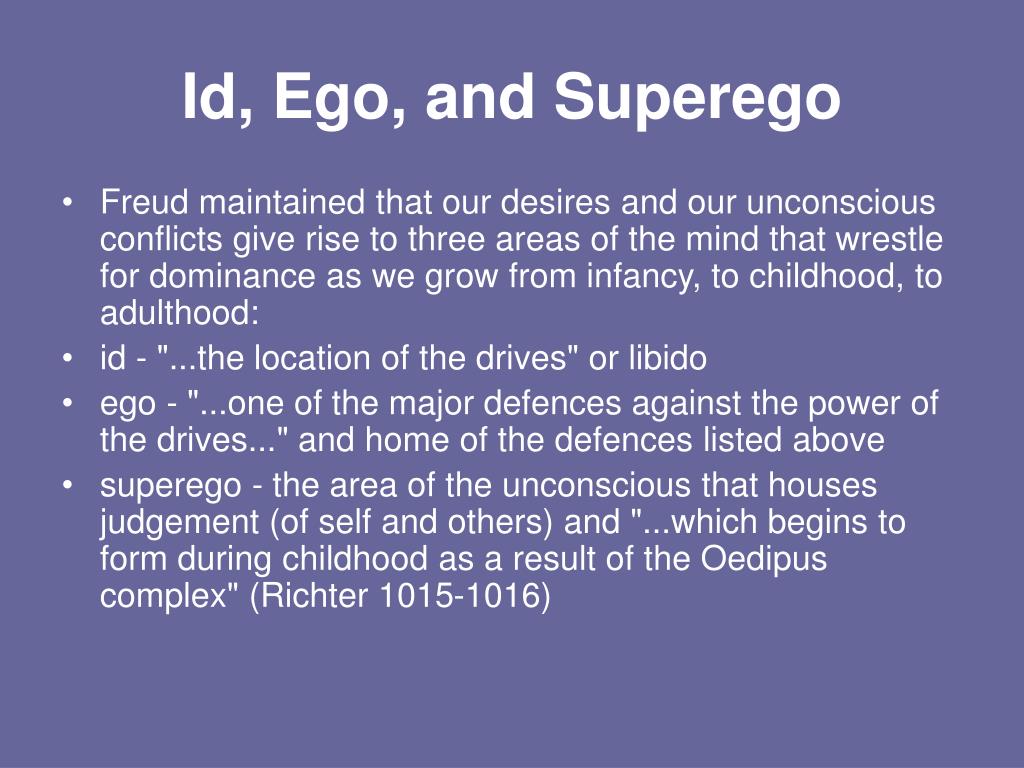

While these are conceptualized as three distinct structures, they are constantly interacting with each other. The tug-of-war between pleasure and fear of penalty is also at the heart of Freud’s personality theory.Īccording to Freud, the human personality consists of three components: Id, Ego, and Superego. Consequently, pleasure can instead be expressed in the unconscious (e.g., through dreams). For instance, our most sordid and hedonistic desires often go unfulfilled out of fear of punishment or social isolation. Yet, the reality of the social world ensures that this cannot always be the case. It states that human beings are motivated to both seek out pleasure while simultaneously attempting to avoid pain. One of the key assumptions of psychology according to Freud is the Pleasure Principle. “Most people do not really want freedom, because freedom involves responsibility, and most people are frightened of responsibility.” ―Sigmund Freud doi:10.1007/978-9-8_616-1Episode #5 of the course The theories of Sigmund Freud by Psychology Insights Online Encyclopedia of Personality and Individual Differences. Is the influence of Freud declining in psychology and psychiatry? A bibliometric analysis. Ego, drives, and the dynamics of internal objects. Conscience.Īmerican Psychological Association. Ego-ideal.Īmerican Psychological Association. Secondary process.Īmerican Psychological Association. Primary process.Īmerican Psychological Association. Reality principle.Īmerican Psychological Association. Pleasure principle.Īmerican Psychological Association. Libido.Īmerican Psychological Association. Collective unconscious.Īmerican Psychological Association. Midlife Eriksonian psychosocial development: Setting the stage for late-life cognitive and emotional health. Malone JC, Liu SR, Vaillant GE, Rentz DM, Waldinger RJ. Un homme manque: Freud's engagement with Alfred Adler's masculine protest: Commentary on Balsam. Neo-Freudian.Īmerican Psychological Association. Oedipus complex.Īmerican Psychological Association. Electra complex.Īmerican Psychological Association.
:max_bytes(150000):strip_icc()/illo_id-ego-superego-599dc5e3c41244001354e25f.png)

R egression: Diagnosis, evaluation, and management. doi:10.7759/cureus.337Īmerican Psychological Association. Association of ego defense mechanisms with academic performance, anxiety and depression in medical students: A mixed methods study. Waqas A, Rehman A, Malik A, Muhammad U, Khan S, Mahmood N.

The International Journal of Psychoanalysis. A brief history of the super-ego with an introduction to three papers. Where did Freud's iceberg metaphor of mind come from?. Some applications to the mindfulness approach with wearable devices. Conscious, Pre-conscious and unconscious mechanisms in emotional behaviour. Freudian slip: When a belief or feeling in the unconscious reveals itself through speaking, writing, or performing a behavior reveals someone's "true wishes or feelings"īalconi M, Fronda G, Venturella I, Crivelli D.Conscience: Part of the superego acts as a judge of our actions and what's "right" and "wrong".Ego ideal: Part of the superego aspires to ideas of goodness taught by our parents and society (i.e., honesty, loyalty, etc.).Secondary process: Conscious thoughts that appease external and internal demands at the same time includes problem solving and planning.Primary process: Unconscious thoughts that are uninhibited by logic one example is magical thinking.Reality principle: The concept by which the ego operates-moderating the id's desire for instant gratification to conform to real-life situations.Pleasure principle: The concept by which the id operates-craving fulfillment of its desires, or instant gratification.Libido: Part of psychoanalytic theory the "life instinct" or "sexual instinct" that provides energy for human activity.Superego: The part of the psyche that aspires to goodness as we've learned it through our parents and society.Ego: The part of the psyche that moderates desires of the id and the superego the ego deals with "real life".Id: The part of the psyche that is present from birth and informs our primitive needs and desires.Unconscious mind: The thoughts, feelings, and emotions that are not part of our awareness, but influence behavior and may appear in dreams.Preconscious: The thoughts, feelings, and emotions that are not part of our awareness, but could come into awareness at any time.Conscious mind: The thoughts, feelings, and emotions, that are part of our awareness.


 0 kommentar(er)
0 kommentar(er)
